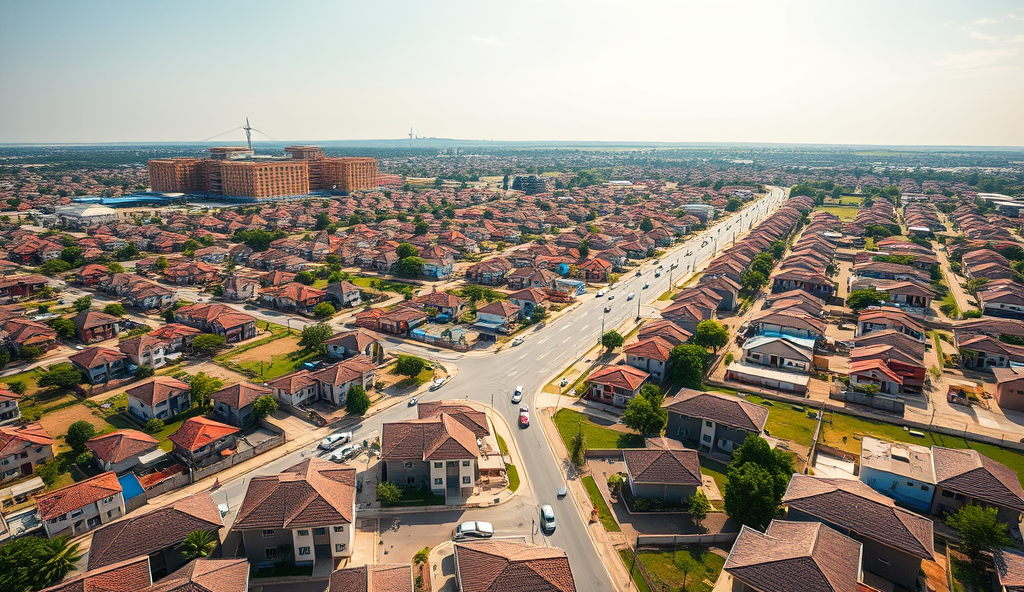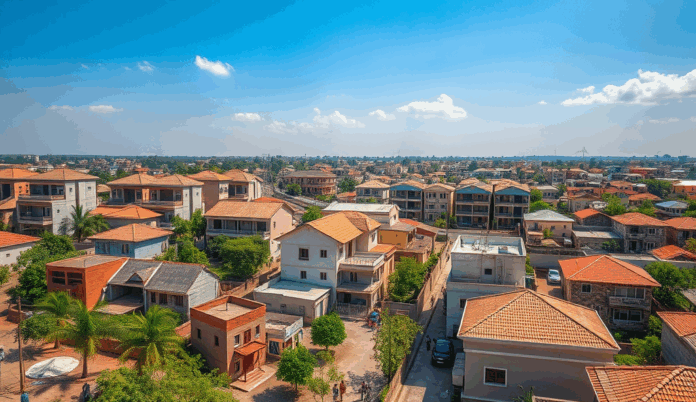Introduction to the Kuje Housing Market in Nigeria
The Kuje housing market has emerged as a promising destination for real estate investors, offering a blend of affordability and growth potential in Nigeria’s Federal Capital Territory. Recent data from the Abuja Geographic Information Systems (AGIS) shows a 15% year-on-year increase in property transactions in Kuje as of Q1 2024, driven by its proximity to Abuja’s city center and lower land prices compared to high-end districts.
Demand for affordable housing in Kuje has surged, with developers launching mid-range residential projects to cater to middle-income earners and young professionals. According to a 2024 report by PropertyPro.ng, average property prices in Kuje remain 30-40% lower than in central Abuja, making it an attractive option for budget-conscious investors seeking long-term appreciation.
Infrastructure developments, including ongoing road expansions and utility upgrades, are further boosting investor confidence in Kuje’s real estate market. The next section will explore how Kuje’s strategic location and improving infrastructure contribute to its growing appeal among property buyers and developers.
Key Statistics

Overview of Kuje’s Location and Infrastructure
The Kuje housing market has emerged as a promising destination for real estate investors offering a blend of affordability and growth potential in Nigeria's Federal Capital Territory.
Kuje’s strategic position 40km southwest of Abuja’s Central Business District gives it a unique advantage, offering urban accessibility while maintaining lower land costs than premium Abuja locations. The Federal Capital Development Authority’s 2024 masterplan identifies Kuje as a key growth corridor, with ongoing upgrades to the Airport Road and Outer Northern Expressway reducing commute times to under 45 minutes.
Recent infrastructure investments have transformed Kuje’s real estate landscape, including the ₦12 billion water treatment plant commissioned in Q3 2023 and expanded electricity coverage reaching 78% of the area by February 2024. These developments complement new commercial hubs like the Kuje Modern Market, creating self-sufficient neighborhoods that reduce dependency on central Abuja.
The area’s improved infrastructure directly impacts property values, with RE/MAX Nigeria reporting 22% appreciation for well-connected parcels near major roads in 2024. This sets the stage for examining how these location advantages translate into current pricing trends across Kuje’s housing market segments.
Current Property Prices and Trends in Kuje
Kuje's strategic position 40km southwest of Abuja's Central Business District gives it a unique advantage offering urban accessibility while maintaining lower land costs than premium Abuja locations.
Kuje’s property market shows strong growth, with land prices near upgraded infrastructure like the Airport Road rising to ₦25-₦35 million per plot as of Q2 2024, a 30% increase from 2023 according to PropertyPro.ng. Residential apartments in gated communities now average ₦45 million, offering 20-25% discounts compared to comparable units in central Abuja.
The rental market reflects similar trends, with 3-bedroom flats in prime areas like Kuje Township leasing for ₦1.2-₦1.8 million annually, per Jumia House Nigeria’s March 2024 report. Demand is particularly high for properties within 5km of the new Kuje Modern Market, where occupancy rates exceed 90%.
Investors are capitalizing on Kuje’s affordability gap, with developers launching mid-range housing projects priced 40% below Abuja’s city center equivalents. This pricing dynamic sets the stage for exploring the diverse property types available across Kuje’s evolving neighborhoods.
Types of Properties Available in Kuje
Kuje's property market shows strong growth with land prices near upgraded infrastructure like the Airport Road rising to ₦25-₦35 million per plot as of Q2 2024 a 30% increase from 2023.
Kuje’s property market offers diverse options, from vacant plots near infrastructure hubs like Airport Road (₦25-₦35 million per plot) to mid-range gated communities with residential apartments averaging ₦45 million, as reported by PropertyPro.ng in Q2 2024. Developers are also introducing affordable duplexes and terraced houses, priced 40% below Abuja’s city center, catering to middle-income buyers.
The rental segment features high-demand 3-bedroom flats in Kuje Township (₦1.2-₦1.8 million annually) and newer serviced apartments near the Kuje Modern Market, where occupancy exceeds 90%. Commercial properties, including retail spaces and mixed-use developments, are gaining traction as the area’s infrastructure improves.
Investors can also find luxury estates and off-plan projects targeting premium buyers, though these remain a smaller segment compared to mid-range offerings. This variety sets the stage for analyzing demand and supply dynamics in Kuje’s evolving housing market.
Demand and Supply Dynamics in Kuje’s Housing Market
Kuje’s housing market shows a clear demand-supply imbalance with PropertyPro.ng reporting a 22% year-on-year increase in residential inquiries in Q2 2024 outpacing new unit deliveries by 15%.
Kuje’s housing market shows a clear demand-supply imbalance, with PropertyPro.ng reporting a 22% year-on-year increase in residential inquiries in Q2 2024, outpacing new unit deliveries by 15%. The most acute shortages exist in the ₦1.5-₦2 million rental segment, where waiting lists now exceed six months for quality 3-bedroom flats near the Modern Market.
Developers are responding with accelerated construction, particularly in mid-range gated communities along Airport Road, where 14 new projects launched in H1 2024 according to the Abuja Developers Association. However, land scarcity near infrastructure hubs has pushed plot prices up 18% since December 2023, creating supply bottlenecks for affordable housing projects.
This tightening market presents both challenges and opportunities for investors, particularly as commercial developments begin matching residential growth. The next section explores specific investment opportunities emerging from these dynamics.
Investment Opportunities in Kuje Real Estate
Kuje's housing market is poised for steady growth with property values projected to rise by 12-15% annually through 2026 driven by increasing demand for affordable housing and improved infrastructure.
The acute housing shortage in Kuje’s ₦1.5-₦2 million rental segment presents prime opportunities for developers, with PropertyPro.ng data showing 62% of inquiries targeting this price range in Q2 2024. Investors can capitalize on the six-month waiting lists by developing compact 3-bedroom units near the Modern Market, where yields average 8.5% annually according to estate valuers Knight Frank Nigeria.
Mid-range gated communities along Airport Road offer another lucrative avenue, with the Abuja Developers Association reporting 78% pre-sale uptake for new projects launched in H1 2024. Strategic land banking near proposed infrastructure hubs could yield significant appreciation, given the 18% plot price surge since December 2023 documented by the Kuje Area Council.
Commercial real estate is emerging as a complementary play, with retail spaces near residential clusters achieving 92% occupancy rates per Broll Nigeria’s 2024 market report. However, as these opportunities multiply, investors must also navigate the challenges shaping Kuje’s evolving property landscape.
Challenges Facing Real Estate Investors in Kuje
Despite Kuje’s booming housing market, investors face infrastructure deficits, with only 40% of roads in developing areas paved according to Kuje Area Council’s 2024 infrastructure audit. Rising construction costs also pose hurdles, with cement prices increasing by 23% year-on-year as reported by the National Bureau of Statistics in Q1 2024.
Land disputes remain prevalent, accounting for 35% of property litigation cases in Abuja’s High Court records from January-June 2024. These legal complexities often delay projects in high-demand areas like the Modern Market corridor where developers report average 8-month approval timelines.
Investors must also contend with fluctuating demand patterns, as evidenced by PropertyPro.ng data showing 15% seasonal variance in rental inquiries between Q1 and Q2 2024. These operational challenges emerge alongside evolving government policies that are reshaping Kuje’s property landscape.
Government Policies Affecting the Kuje Housing Market
Recent policy shifts are reshaping Kuje’s real estate dynamics, with the FCT Administration’s 2024 Land Use Act amendments requiring stricter compliance for title conversions, potentially prolonging approval timelines beyond the current 8-month average. The Abuja Infrastructure Tax Credit Scheme, launched in Q1 2024, offers developers 15% tax rebates for road projects in underserved areas like Kuje’s emerging corridors.
The Central Bank’s revised mortgage guidelines have increased accessibility to housing loans, with commercial banks reporting 22% more mortgage applications in Kuje between January-May 2024 compared to 2023. However, new environmental regulations impose higher compliance costs, adding approximately 7% to project budgets according to developer surveys by the Real Estate Developers Association of Nigeria.
These policy changes intersect with earlier noted challenges like infrastructure gaps and construction costs, creating both opportunities and constraints for investors. As regulations evolve, market participants must adapt their strategies to align with Kuje’s transforming property landscape while anticipating future growth areas.
Future Prospects for the Kuje Housing Market
Kuje’s housing market is poised for steady growth, with property values projected to rise by 12-15% annually through 2026, driven by increasing demand for affordable housing and improved infrastructure under the Abuja Infrastructure Tax Credit Scheme. Developers are focusing on mid-income residential projects, particularly along the Kuje-Gwagwalada corridor, where land prices remain 30% lower than central Abuja despite 18% appreciation in 2024.
The revised mortgage guidelines and growing population (projected to exceed 500,000 by 2025) create strong fundamentals, though investors must navigate rising compliance costs and extended approval timelines under new land use regulations. Emerging neighborhoods like Gaube and Tungan Maje show particular promise, with recorded 25% faster sales velocity compared to other Kuje submarkets in Q2 2024.
While construction costs remain elevated, strategic partnerships with local authorities for tax-incentivized projects could offset these challenges, positioning Kuje as a balanced investment proposition between risk and reward. This evolving landscape sets the stage for informed decision-making about long-term participation in Kuje’s property market.
Conclusion and Final Thoughts on Investing in Kuje
Kuje’s housing market presents a compelling opportunity for real estate investors, with property prices rising by 15% in 2024 and demand driven by Abuja’s expansion. The area’s affordability compared to central Abuja, coupled with ongoing infrastructure projects like the Kuje-Abuja Road, enhances its long-term growth potential.
Investors should prioritize residential developments and land acquisitions, as rental yields hover around 8-10% due to increasing demand from middle-income earners. With new housing projects like Kuje Gardens gaining traction, the market is poised for sustained appreciation.
While challenges like delayed infrastructure exist, strategic investments in high-demand zones like Kuje Phase 2 offer solid returns. For those seeking affordable entry into Nigeria’s real estate market, Kuje remains a standout choice.
Frequently Asked Questions
What are the best areas in Kuje for high rental yields?
Focus on properties within 5km of Kuje Modern Market where occupancy exceeds 90% and yields average 8.5% annually according to Knight Frank Nigeria.
How can I verify land titles in Kuje to avoid disputes?
Use Abuja Geographic Information Systems (AGIS) for official verification and engage local surveyors to confirm boundaries before purchase.
What type of residential properties are most in demand in Kuje?
3-bedroom flats in the ₦1.5-₦2 million rental range have six-month waiting lists making them the safest investment per PropertyPro.ng data.
Are there tax incentives for developing infrastructure in Kuje?
Yes the Abuja Infrastructure Tax Credit Scheme offers 15% rebates for road projects in underserved areas as launched in Q1 2024.
How much should I budget for land acquisition in prime Kuje locations?
Allocate ₦25-₦35 million per plot near Airport Road where prices rose 30% in 2024 but offer strong appreciation potential.


